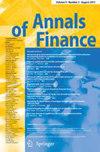福利与银行风险承担
IF 0.7
Q4 BUSINESS, FINANCE
引用次数: 0
摘要
我们的研究调查了一个包含道德风险和银行风险承担激励机制的一般均衡银行模型,尤其关注存款市场的竞争。我们的研究结果表明,当银行在存款市场上完全竞争时,会带来最大的福利和最佳的银行倒闭风险水平。即使竞争性银行的倒闭风险高于垄断租金银行的倒闭风险,这一结果依然有效,而且不受银行倒闭相关社会成本的影响。我们的模型表明,银行竞争与金融稳定之间并不存在权衡。我们的结果支持卡尔森、科雷亚和勒克(J Polit Econ 130(2):462-520, 2022).本文章由计算机程序翻译,如有差异,请以英文原文为准。
Welfare and bank risk-taking
Our study investigates a model of general equilibrium banking that incorporates moral hazard and incentive mechanisms for bank risk-taking, with a particular focus on deposit market competition. Our findings reveal that when banks compete perfectly in the deposit market, it leads to maximal welfare and an optimal level of bank failure risk. This outcome remains valid even if the risk of failure for competitive banks is higher than that of banks with monopoly rents, and it is not affected by social costs associated with bank failures. Our model suggests that there is no trade-off between bank competition and financial stability. Our results support the empirical findings of Carlson, Correia, and Luck (J Polit Econ 130(2): 462–520, 2022).
求助全文
通过发布文献求助,成功后即可免费获取论文全文。
去求助
来源期刊

Annals of Finance
BUSINESS, FINANCE-
CiteScore
2.00
自引率
10.00%
发文量
15
期刊介绍:
Annals of Finance provides an outlet for original research in all areas of finance and its applications to other disciplines having a clear and substantive link to the general theme of finance. In particular, innovative research papers of moderate length of the highest quality in all scientific areas that are motivated by the analysis of financial problems will be considered. Annals of Finance''s scope encompasses - but is not limited to - the following areas: accounting and finance, asset pricing, banking and finance, capital markets and finance, computational finance, corporate finance, derivatives, dynamical and chaotic systems in finance, economics and finance, empirical finance, experimental finance, finance and the theory of the firm, financial econometrics, financial institutions, mathematical finance, money and finance, portfolio analysis, regulation, stochastic analysis and finance, stock market analysis, systemic risk and financial stability. Annals of Finance also publishes special issues on any topic in finance and its applications of current interest. A small section, entitled finance notes, will be devoted solely to publishing short articles – up to ten pages in length, of substantial interest in finance. Officially cited as: Ann Finance
 求助内容:
求助内容: 应助结果提醒方式:
应助结果提醒方式:


